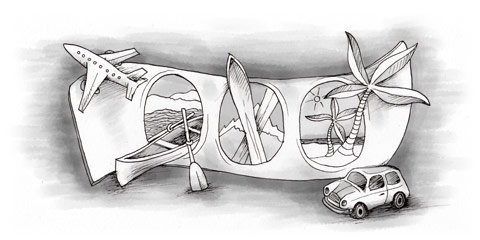It’s estimated that in 2006 4.6 billion kilometres were cycled in the UK. Most people buy cycles for shopping or getting around towns, rather than cycling purely for pleasure, exercise or sport (e.g. touring or racing). Competitive cycling embraces road and track racing, cycle speedway, time-trialling, cross-country racing, touring, bicycle polo and bicycle moto-cross.
A wide range of cycles is available to suit all pockets and needs, ranging from a very basic shopping bike costing around £100 to a professional racing bike costing thousands. In between these extremes are commuter or town bikes, touring bikes, mountain bikes, BMX bikes, tricycles, tandems and bicycles with folding frames. Before buying a bike, carefully consider your needs, both now and in the future, obtain expert advice (e.g. from a specialist cycle store) and shop around for the best deal. Make sure you purchase a bike with the correct frame size. Mountain bikes have become increasingly popular in recent years and cost from around £150 up to £4,000 (expect to pay around £200 to £300 for an adequate bike).
Bicycles can also be hired by the day or week from cycle shops in cities and tourist areas; costs vary considerably, but are usually from around £5 to £10 a day depending on the type of bike (town, touring or mountain) and the area. Tandems, tricycles and folding bikes can also be hired in some areas. There may be lower rates for children and for weekly rental. Ask at local Tourist Information Centres or check the local yellow pages. Make sure a hired bicycle is insured against theft or damage.
Apart from travel to work or into town, cycling is an excellent way to explore the countryside at your leisure and get some fresh air and exercise at the same time. However, fresh air is in short supply in the UK’s polluted cities, where many cyclists wear face-masks as protection against traffic emissions (although, according to medical experts, they offer little or no protection against carbon monoxide). The growing popularity of cycling in recent years has led to an increase in the number of accidents with motor vehicles. It’s important never to underestimate the dangers of cycling (particularly for children) on the UK’s overcrowded roads. British motorists don’t respect cyclists as much as their counterparts in most continental countries and cyclists in the UK are ten times more likely to be involved in an accident than those in (for example) Denmark. Helmets are essential attire, particularly for children, as is reflective clothing and bright (preferably flashing) lights at night.
Cycling Paths Network in England
There are now large numbers of cycle paths all around towns in the UK, a decision made in 1995 gave the go-ahead to build a national network of 8,000km (5,000mi) of dedicated cycling paths at a cost of £42.5m, partly funded by the National Lottery ‘Millennium Fund’. Radical measures have been put forward to promote cycling in an effort to reduce traffic congestion and pollution on the roads. Some towns and cities plan to solve (or ease) their traffic problems by introducing cycle priority routes, including traffic light priority, lock-up parking and even changing rooms for wet cyclists.
If you’re interested in joining a cycling club, your local library should have information about local clubs or you can contact the British Cycling Federation, National Cycling Centre, Stuart Street, Manchester M11 4DQ (0870-871 2000,
www.britishcycling.org.uk ). Keen cyclists may be interested in joining the Cyclists Touring Club (CTC), Parklands, Railton Rd, Guildford, Surrey GU2 9JX (0870-873 0060, www.ctc.org.uk ), which is the UK’s national cyclists’ association with over 200 local groups throughout the UK. The CTC actively campaigns for the rights and safety of cyclists on the road and publishes an excellent free booklet, Positive Cycling. Membership includes free third party insurance, legal aid, technical advice, touring information and a bimonthly magazine. The CTC also operates a bicycle insurance scheme.
An interesting book for those who live in the London area is On Your Bike, published by the London Cycling Campaign, 2Newhams Row, London, SE1 3UZ (020-7234 9319, www.lcc.org.uk ). Other useful books include Richard’s New Bicycle Book by Richard Ballantine (Pan), which is a guide to choosing and using a bicycle (and can be bought at the Bicycling Bookshop) and Complete Bike Book by Chris Sidwells (Dorling Kindersley). Ordnance Survey publishes a series of excellent Cycle Tours. Local cycling guides and maps are published by councils, conservation and cycling groups in many areas, who also publish safety booklets and brochures for children. Around 15 magazines are published for cyclists, including Cycling Plus, Cycling Weekly, Cycle Sport and Mountain Biking UK.
BMX
Rinks and specially designed circuits are provided in many towns for BMX cycles (acrobatics on a bicycle). Children can start at around seven, but participants of all ages should be protected against falls with crash helmets and elbow and knee pads. It’s difficult to hire equipment, as it’s too easily stolen, although BMX bikes can usually be hired. The cost of using purpose-built facilities is around £2 to £5 (including the hire of a bike) or nearer £1, if you provide your own bike.
This article is an extract from Living and working in Britain. Click here to get a copy now.


